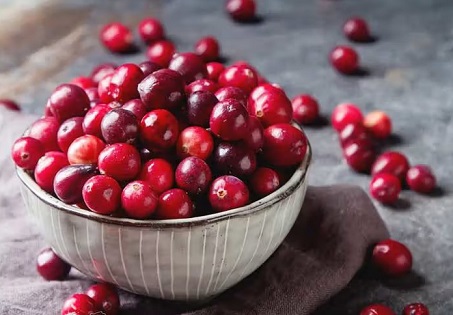Herbs And Phytochemicals: Phenolic Acids And Flavonoids From Cranberries Identified As Potential Antivirals Against SARS-CoV-2
Nikhil Prasad Fact checked by:Thailand Medical News Team Jan 26, 2024 1 year, 2 months, 4 weeks, 1 day, 4 hours, 22 minutes ago
Herbs And Phytochemicals: The relentless evolution of the severe acute respiratory syndrome coronavirus 2 (SARS-CoV-2) and the emergence of new variants have posed significant challenges in the global fight against the COVID-19 pandemic. Despite the development of antiviral drugs, the continuous mutations of the virus demand innovative therapeutic strategies. This
Herbs And Phytochemicals study delves into the potential antiviral properties of cranberry phytochemicals, aiming to identify effective inhibitors against the SARS-CoV-2 main protease (Mpro).
 Phenolic Acids And Flavonoids From Cranberries Identified As Potential Antivirals Against SARS-CoV-2
The Urgency for Novel Antiviral Strategies
Phenolic Acids And Flavonoids From Cranberries Identified As Potential Antivirals Against SARS-CoV-2
The Urgency for Novel Antiviral Strategies
With over half a billion confirmed cases and millions of deaths worldwide, the COVID-19 pandemic remains a pressing global health crisis. The ongoing mutations of SARS-CoV-2, leading to variants of concern, emphasize the need for precise and effective antiviral strategies. Current treatment options, while limited, include drugs like Remdesivir, Tocilizumab, Baricitinib, and the combination of Nirmatrelvir and Ritonavir. In many clinical settings, the efficacy of these approved drugs is still being questioned along with concerns about their adverse effects. Hence, the quest for novel molecules with enhanced efficacy continues.
SARS-CoV-2 Proteins as Targets
Understanding the structural proteins of coronaviruses, including the main protease (Mpro), is crucial for identifying potential antiviral targets. Mpro plays a pivotal role in viral genome replication and virion packaging, making it an attractive target for drug development. Despite the virus's continuous evolution, the Mpro structure remains relatively conserved across variants, making it an ideal candidate for antiviral interventions.
The Role of Phytochemicals in Antiviral Activity
Natural compounds, particularly phytochemicals derived from plants, have demonstrated antiviral properties with fewer adverse effects. Cranberry (Vaccinium oxycoccos subsp. Microcarpum) is recognized for its health benefits attributed to various phytochemicals, including phenolic acids and flavonoids. Recent studies have highlighted cranberry's antiviral potential against dengue, zika virus, influenza, and even SARS-CoV-2. Additionally, innovative applications, such as antimicrobial textiles derived from cranberry extracts, further underscore the versatility of cranberry in combating viral infections.
Methods - From In Silico to In Vitro Approaches
The study adopts a comprehensive approach, combining in silico and in vitro methodologies to explore the therapeutic potential of cranberry against SARS-CoV-2. The initial step involved the identification of cranberry-derived phytochemicals using three independent databases. Molecular docking, a virtual screening technique, was employed to assess the binding affinity of 250 phytochemicals to the Mpro active site. The top three candidates, namely cyanidin 3-O-galactoside, β-carotene,
and epicatechin, are then subjected to further validation through molecular dynamics simulation.
In Vitro Enzymatic Assays and Phytochemical Extraction
The study progressed to in vitro enzymatic assays to determine the inhibitory potential of the identified phytochemicals. Cyanidin 3-O-galactoside emerged as the most potent inhibitor, with an IC50 of 9.98 μM. Further exploration involving extracting phytochemical classes from frozen cranberry, with anthocyanins, including cyanidin 3-O-galactoside, exhibited the highest inhibitory potential. This aligns with the broader class-specific inhibitory trends, with anthocyanins surpassing carotenoids and flavanols.
Confirming Antiviral Efficacy Through LC-MS/MS Analysis
To corroborate the findings, targeted LC-MS/MS analysis confirmed the antiviral efficacy of these identified phytochemicals from cranberries against the SARS-CoV-2 virus. This robust analytical technique strengthens the study's credibility, affirming that the bioactive compounds identified through computational and enzymatic assays are indeed present in cranberry and are effective as SARS-CoV-2 inhibitors.
Harnessing Phytochemicals for Antiviral Action
The discussion delves into the broader context of phytochemicals as potent bioactive compounds with antiviral properties. The study's focus on cranberry underscores the fruit's potential as a nutraceutical powerhouse. The inhibition of SARS-CoV-2 Mpro by cranberry-derived compounds, particularly anthocyanins, aligns with the growing body of evidence supporting natural compounds as effective antiviral agents.
Conclusion: Cranberry as a Potential Therapeutic Intervention
In conclusion, the study provides compelling evidence supporting the therapeutic potential of cranberry phytochemicals against SARS-CoV-2. The identified compounds, cyanidin 3-O-galactoside, β-carotene, and epicatechin, offer promising avenues for drug development. Cranberry, with its rich repository of bioactive compounds, emerges as a viable candidate for therapeutic interventions against COVID-19. The integration of computational and experimental approaches strengthens the study's findings, paving the way for further research and development in the quest for effective antiviral strategies.
The study findings were published in the peer reviewed International Journal of Biological Macromolecules.
https://www.sciencedirect.com/science/article/abs/pii/S0141813024004586
For the latest
on Herbs And Phytochemicals, keep on logging to Thailand Medical News.
